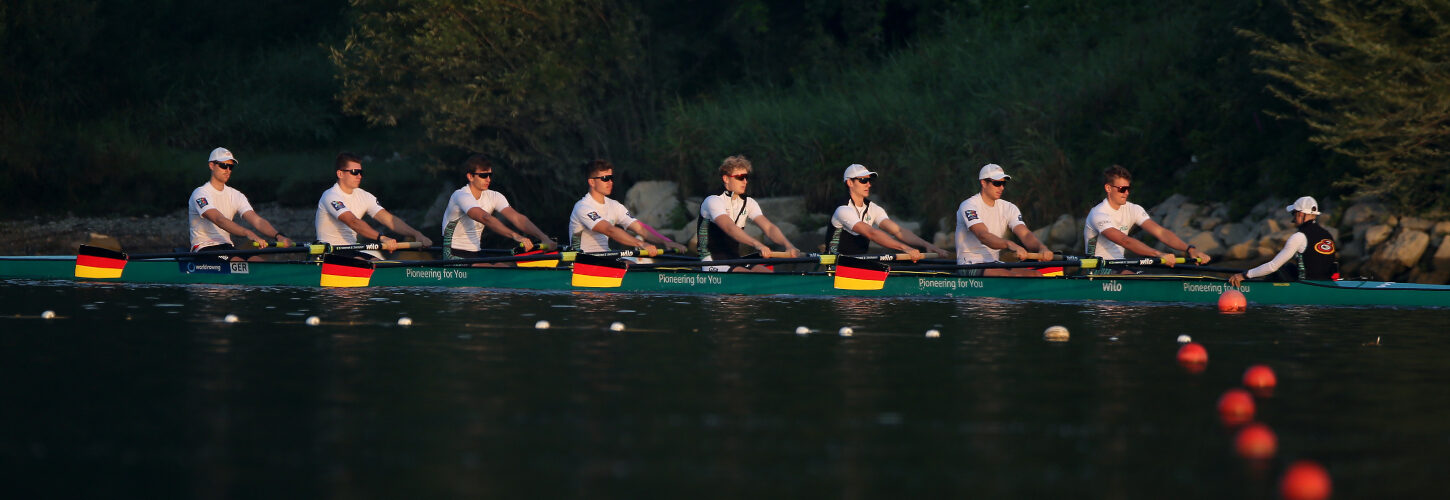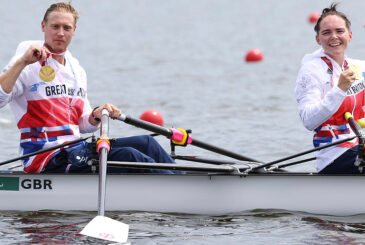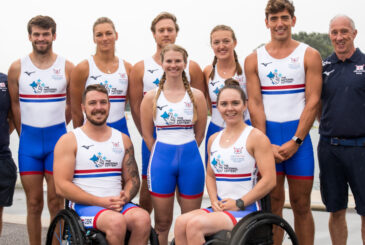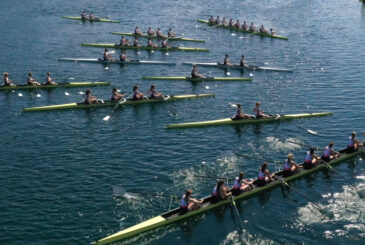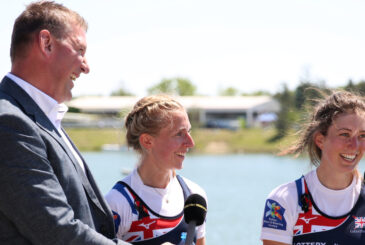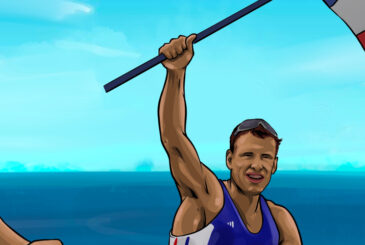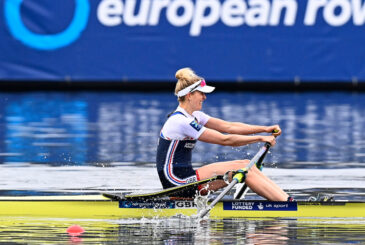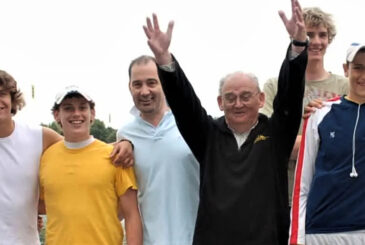Martin Cross meets Jakob Schneider, ‘the big five man’ in the legendary Deutschland-Achter and hears how he’s turned his setbacks into success
There is something magical about watching the German eight blast out of the blocks. The blistering pace, synchronicity and flow of the crew is just breathtaking. It’s that kind of form that has seen Germany’s top boat win three consecutive world titles.
At the very heart of that success has been a warm, resilient and unassuming 26-year-old oarsman from Breisach in southern Germany.
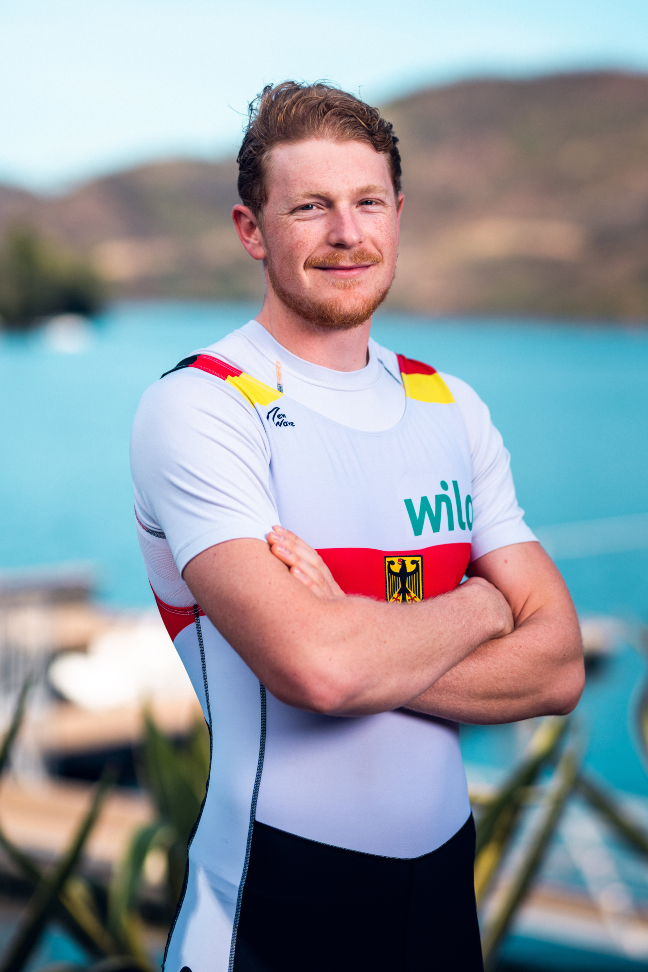
Since 2017, the 1m 98cm Jakob Schneider has been a key member of the German eight, his power, poise and 96 kilos anchoring the crew from the five-seat. But the rower who the World Rowing commentary team calls: ‘the big five man’, won’t be drawn as to whether his personality is more extrovert, or introvert.
The extrovert part of him relishes the camaraderie of his crew mates while the introvert loves nothing better than to play his keyboard at home in his flat – the music to Christopher Nolan’s films, like Interstellar, are a particular favourite of his.
“Everyone knows what’s coming with the German eight – a really fast start”
The German eight recently had a couple of weeks’ break, so Jakob and his girlfriend took off to the Dutch coast where he has a three-berth sailing boat moored. One way and another it seems the trainee biology and politics teacher has been around water for most of his life.
Back in Breisach, the young Jakob grew up watching rowing boats out on the Rhine and fancied he might one day do the same. It was while rowing there as a 16-year-old that he began to learn that an apparent misfortune – like the loss of a coach – can, in time, create the conditions for success.
It’s been a recurring theme throughout his career.
In Breisach, his coach was fired. That led Jakob to apply to a sports boarding school in Essen, 500 kilometres to the north. Straightaway he found himself in an environment with six rowing clubs – rather than Breisach’s one – and a much wider potential group of partners to choose from. This helped him gain selection in a four at the 2012 World Rowing Junior Championships – he won a bronze medal.
Jakob is aware of a similar pattern later in his career too.
Just before a crucial assessment in 2017, his partner in the pair told him that he was retiring from the sport. At first it seemed like too big a setback to recover from, but soon Jakob ended up pairing with the potential stroke-man of the new German eight, Hannes Ocik. At the national trials the two made the A final and consequently found seats in the German eight– the boat that every German oarsman dreams of rowing in.
“Technically, I’m not the typical rower from the catch – I use my torso a little bit more than I should”
The boy who had kept with the sport for the fun it gave him – rather than the success it brought – was now on the verge of a whole new adventure.
Martin Cross finds out more…
Martin: What qualities do you bring to the German eight?
Jakob: The eight was being rebuilt after Rio, with only three rowers continuing. I think I brought a physical presence.
I like to think that if everyone in the eight was at 100% effort, I’d be at 102% so the other guys might have to hold me up at the medal ceremony.
Technically, I’m not the typical rower from the catch – I use my torso a little bit more than I should. But the eight is all about the catch and getting the pressure on the blade as fast as you can. I’m usually still working on my technique up to the World Championships.
“I’m not scared of pain, but of letting my team mates down”
How do you rate yourself as an oarsman?
I’m a typical German eight’s oarsman. I’m not this big natural talent or in the category of someone like Hamish Bond. But I have the confidence to say I’m a good rower because I know I’m a three-times world champion.
Our cox, Martin [Sauer] says that in the eight we don’t need talent, we need workers because talent is the biggest enemy of success. In the end, it’s about your willingness to work.
What motivates you during a race?
I’m usually a little bit scared on the start, especially when the winner of the other heat has posted a quicker time. Everyone knows what’s coming with the German eight – a really fast start.
A lot of teams have the ability to find their ‘wings’ for one race but to do it consistently, to hurt yourself every race, that’s not easy. I’m not scared of pain, but of letting my team mates down. That’s a great motivator.
It feels really great when you know you have the pace and no other team can match that speed. But we have the confidence – when it was tight in the last 500m – to know that we could hang on. They’re the hardest moments in racing when two crews are close driving for the line, so it’s really satisfying when you look up at the board and it says that Germany was first.
How important has Martin Sauer and your coach Uwe Bender been to the German eight?
Martin Sauer is probably the main reason for the success of the German eight in the last 12 years. He has a vision of how he wants the eight to row and the skills to drill his team to achieving it.
After a defeat Martin gets really emotionally involved. That’s something where Uwe Bender is really important. He can bring a team together with the level of kindness and respect for each other.
We have a really strong trust in him; that he will get the eight to be 100% physically ready when they need to be.
Martin plans to quit after 2021 and make way for Jonas Wiesen. Then we will see another style of rowing for the German eight.
“We don’t have two guys like the British eight that can pull under 5:40”
How would you describe Martin’s approach?
When your blade’s in the water it’s about using every inch or centimetre of the stroke to move the boat.
Rowing is about acceleration and so you need to get everything on the blade that will help you to accelerate the boat, while avoiding using anything that makes the boat decelerate. It’s not that rowing’s rocket science. It’s about who does the basics the best.
In 2019 we weren’t at our best level and lost to the British at Rotterdam. Between then and the World Championships we really worked on the basics to get the eight moving well.
How’s your 2k erg score?
It’s a little bit below average for the German eight. As you might have heard the German eight isn’t about ergometer times. We don’t have two guys like the British eight that can pull under 5:40. Our average is not a lot under 5:50.
“Jürgen Grobler is a coaching legend and I will be rowing against some of his incredible rowers like Moe Sbihi”
What about preparations for Tokyo 2021?
We are really close to our goal of being Olympic champions, but the field is so close – there are about four crews that could win it. For sure it won’t be the Olympic Games as we know them – we’re all waiting for a vaccine.
Right now, we’re focused on preparing for the European Championships in Poland, where we’ll race the Dutch eight. In fact, if the Europeans had been postponed, we’d have arranged a private race with the Dutch to test our speed. They were keen to do this.
How do you see your British rivals ahead of Tokyo?
Everyone heard of Jürgen Grobler’s retirement. We all know he’s always good for a gold medal, so on the one hand you could say that’s probably good for us. But you just don’t know – as I’ve said sometimes change brings a success.
I have to remind myself that Jürgen Grobler is a coaching legend and I will be rowing against some of his incredible rowers like Moe Sbihi.
Photos: Feedbuilders and Meinruderbild.
Thanks also to the German Rowing Federation.


